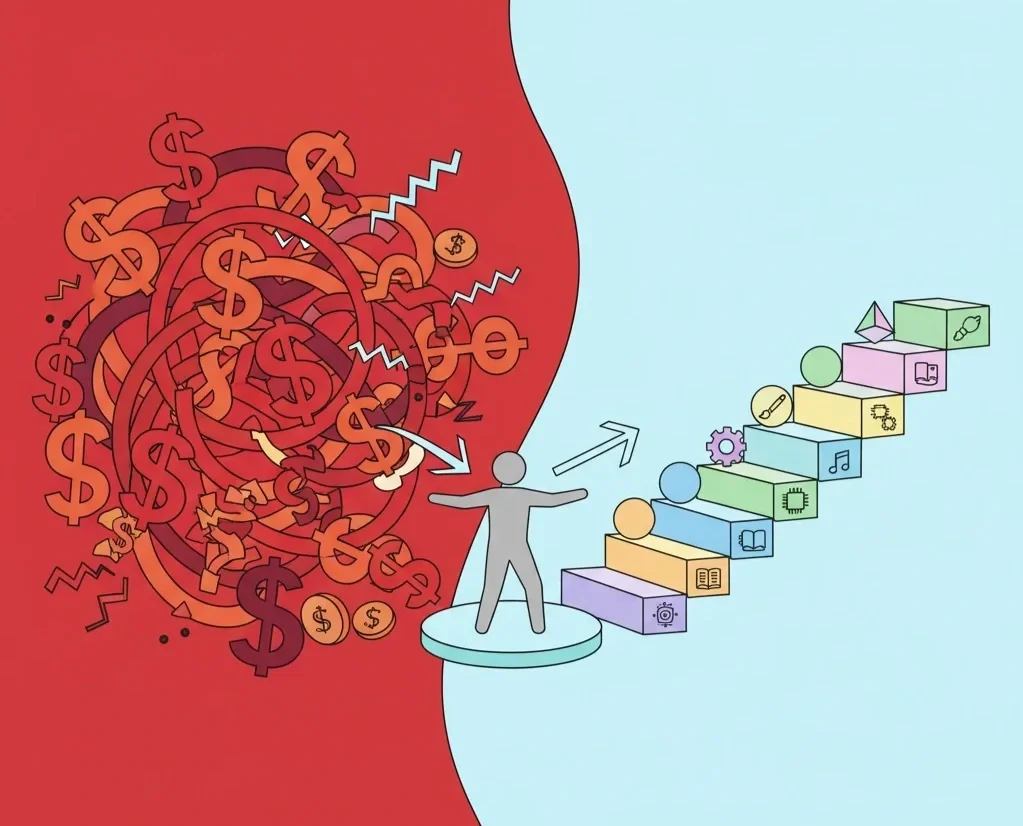Money vs. Mindset: Which Comes First?
I used to be all about the money. Like, obsessively so. Every decision I made came down to one question: "Will this make me more cash?" I thought loving money and chasing financial gain was the straight path to success. Spoiler alert: it wasn't.
Now I'm starting to think completely differently. Instead of fixating on dollar signs, I'm focusing on improving my social skills, sales ability, speaking, and personality. My belief is that if I succeed in developing these skills, the money should follow naturally.
But this shift got me thinking: and I want to hear from you too. Does self-improvement really come before financial success? Or am I just fooling myself with feel-good personal development nonsense?
Related Podcast: Episode 34: Money vs Mindset: Which Comes First?
The Money-First Trap
Let's be real about what happens when you lead with money. When every conversation, every relationship, and every opportunity gets filtered through "How much can I make from this?" you end up making some pretty short-sighted decisions.
I've seen business owners (myself included) take on clients they knew were a nightmare just because the check was big. The result? Burnout, damaged reputation, and ironically, less money in the long run. Building trust with clear customer choices becomes impossible when you're just chasing the biggest payday.
When money comes first, you're essentially putting the cart before the horse. You're trying to harvest before you've planted anything worthwhile. And here's the kicker: people can smell desperation from a mile away. That money-hungry energy? It repels the very opportunities you're trying to attract.
Skills Pay the Bills (Eventually)
Here's what I've learned: skills are like compound interest for your career. They might not pay off immediately, but they build on each other in ways that pure hustle never can.
Take speaking skills, for example. Getting better at communicating doesn't just help you close more sales: it helps you build better relationships with your team, resolve conflicts faster, and present your ideas more convincingly. These improvements ripple through every aspect of your business.
Same goes for social skills. Learning to read people, connect genuinely, and navigate different personalities isn't just nice-to-have fluff. It's the foundation of everything from avoiding burnout and staying consistent to aligning remote teams.
The research backs this up too. Behavioral finance studies show that your mindset often determines your actions. If you believe success is possible and you're worthy of it, you're more likely to take the right steps to get there. But if you're just focused on money without the underlying skills and mindset, you're like someone trying to drive a car without learning how to steer.
The Real-World Test
I see this play out constantly in the business world. The entrepreneurs who last aren't necessarily the ones who made the most money fastest. They're the ones who invested in becoming better leaders, communicators, and problem-solvers.
Look at any successful business owner you admire. I guarantee their success story isn't "I focused really hard on making money and then I did." It's more like "I got really good at solving problems, building relationships, and serving customers: and the money followed."
This doesn't mean money doesn't matter. Obviously, we all need to pay the bills and create stability with unsteady revenue. But when you lead with skills and character development, the financial success tends to be more sustainable and fulfilling.
The Mindset Shift in Action
So how does this actually work in practice? Let me break it down:
Instead of: "How can I make more money this quarter?"
Ask: "What skills would make me more valuable to my customers?"
Instead of: "What's the highest-paying opportunity?"
Ask: "What opportunity will teach me the most?"
Instead of: "How do I get people to buy from me?"
Ask: "How do I become someone people want to work with?"
This shift changes everything. When you're focused on growth and improvement, you start making different choices. You might turn down a high-paying gig that doesn't align with your values. You might invest time in learning new skills instead of just grinding harder on the same old tactics.
And here's the beautiful part: customers can tell the difference. When you're genuinely focused on becoming better at serving them, they respond differently. Trust builds faster. Referrals come more naturally. Customer demand drives business pivots instead of you desperately chasing every trend.
The Labor Sync Example
At Labor Sync, we've seen this principle play out repeatedly. The construction companies that succeed with our time tracking software aren't the ones just looking to save money on payroll (though that's a nice bonus). They're the ones focused on building better processes, creating accountability without micromanagement, and developing stronger team cultures.
When business owners focus on improving their management skills and building systems that help their teams succeed, the financial benefits follow. They reduce waste, increase productivity, and create workplaces people actually want to be part of. The money comes, but it comes as a result of genuine improvement.
Why This Matters More Now
In today's economy, pure hustle isn't enough anymore. Everyone's hustling. Everyone's grinding. The businesses that stand out are the ones led by people who've invested in becoming genuinely better at what they do.
Think about it: would you rather work with someone who's clearly just trying to extract maximum profit from you, or someone who's genuinely skilled and focused on doing great work? The choice is obvious, which is why the skills-first approach actually leads to better financial results over time.
Plus, there's the sustainability factor. Loving your business again when you're done with the pure money chase is a real thing. When you build your success on skills and genuine value creation, you don't burn out the same way. You can actually enjoy the journey instead of just surviving until the next payday.
Making the Switch
If you're ready to flip the script from money-first to skills-first, here are some practical steps:
Start with self-awareness. What skills would make the biggest difference in your business right now? Communication? Sales? Technical expertise? Leadership? Pick one and commit to improving it.
Measure differently. Instead of only tracking revenue, start tracking skill development. Are you getting better at difficult conversations? Are your presentations improving? Are customers responding differently to your approach?
Choose growth opportunities over quick wins. When faced with a choice between easy money and genuine learning, lean toward learning. The skills you develop will pay dividends for years.
Focus on becoming someone worth following. People want to do business with competent, trustworthy, skilled professionals. Work on becoming that person instead of just trying to convince people you already are.
The Compound Effect
Here's what I've noticed: when you focus on skills first, the money doesn't just come: it comes in better ways. Instead of constantly hustling for the next client, people start seeking you out. Instead of competing on price, you compete on value. Instead of working harder, you start working smarter.
And the beautiful part? The skills stack. Getting better at communication makes you better at sales. Being better at sales makes you better at leadership. Being better at leadership makes you better at building systems. Each improvement amplifies the others.
This is exactly what we see with businesses that implement proper time tracking and team management systems. It's never just about the accurate data being an underrated growth tool. It's about developing the skills to use that data effectively, building better relationships with your team, and creating systems that support long-term success.
Your Turn
So here's my question for you: Have you experienced this tension between chasing money and developing skills? Which approach has worked better for you?
I'm genuinely curious about your experience. Have you found that focusing on self-improvement leads to better financial results? Or am I overthinking this whole thing?
Maybe you've tried both approaches and have war stories to share. Maybe you're still figuring it out. Either way, I'd love to hear your thoughts.
Because at the end of the day, we're all trying to build something meaningful: something that pays the bills but also pays the soul. And I have a feeling the answer isn't choosing between money and mindset, but finding the right sequence that works for you.
What's your take? Money first, or skills first? Let me know in the comments: I'm always learning too.





